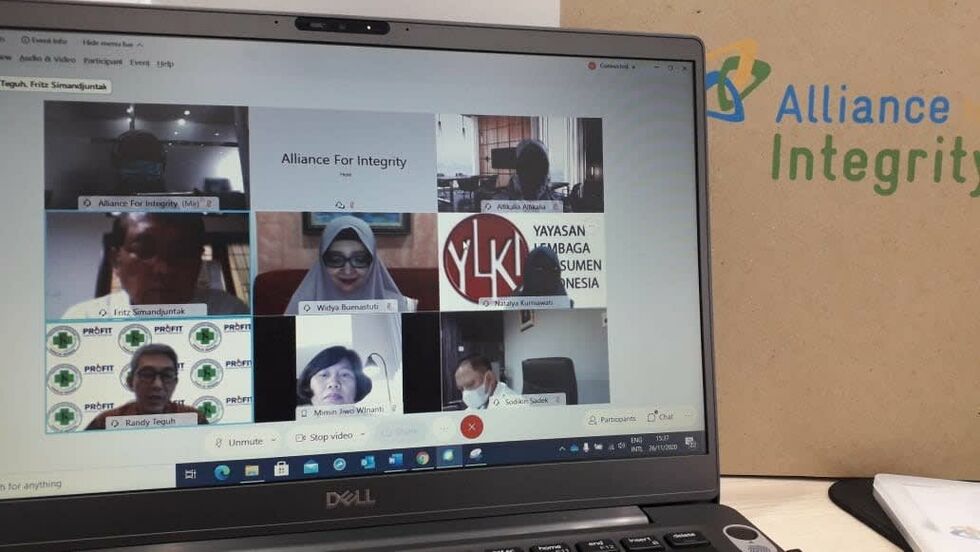Integrity, Transparency and Collective Action as Key to Prevent Counterfeiting in the Health Sector
26.11.2020
Indonesia, online

The Covid-19 pandemic has brought major challenges to the healthcare sector along with the increasing need for medicines and Personal Protective Equipment (PPE). The government and health sector have been making great efforts to ensure the adequacy of medicines and PPE in the pharmaceutical market for health workers as well as the broad public. However, the dependence on imported raw materials and medicines can enlarge the risk of counterfeiting, due to easy access and more affordable prices. In times of crisis, integrity, transparency and collective action are important approaches to prevent and overcome this problem.
In collaboration with Transparency International Indonesia, Indonesia Business Links and Indonesia Global Compact Network, the Alliance for Integrity organised the first Integrity Talks event under the headline “The Role of the Healthcare Sector during the Pandemic Era: Fighting Counterfeit Medicines and PPE in Times of Covid-19”. Integrity Talks is a new virtual format that consists of three panel discussions aiming to promote transparency, integrity and collective action in times of crisis. The format was elaborated by the Advisory Group of the Alliance for Integrity in Indonesia. Setting the tone for the series, the kick-off event initiated a multi-stakeholder dialogue on the opportunities and challenges that the healthcare sector is currently facing in combating counterfeit medicines and PPE. Recognising the importance of prevention measures, the discussion also directed to raise public awareness about the risk of counterfeiting and to promote transparency and integrity within supply chains.
Fritz E. Simandjuntak, Vice President Communication at the Indonesia Global Compact Network, moderated the discussion. As opening he provided an overview of the topic and explained that Indonesia is quite dependent on imported medicines particularly during the Covid-19 outbreak, which according to Joko Widodo, President of Indonesia, is a major concern due to the large foreign exchange expenses for the purchase of imported medicines. However, the public is expecting medicines at a more affordable price.
Starting the dialogue from the government perspective, Sodikin Sadek, Director of Medical Devices Supervision and Household Health Supplies Ministry of Health, pointed out that the government has implemented a policy relaxation to increase the availability of medical devices, especially for PPE manufacturers who require product licenses and certificates.
This policy also aims to help small and medium-sized enterprises (SMEs) to avoid bankruptcy in times of crisis. As a result, there has been a drastic increase in PPE manufacturers since February 2020. Moreover, he emphasised that the government has carried out regular monitoring towards these new products to prevent and overcome the risk of counterfeiting.
A clear strategic approach is needed to ensure efficient control mechanisms for counterfeit medicines and PPE. Head of Sub-Directorate of Medicine Distribution Facilities, National Agency of Drug and Food Control (BPOM), Mimin Jiwo Winanti, highlighted some key strategies such as cross-sectoral coordination, reporting mechanisms, law enforcement, and awareness-raising. Increasing public awareness is very important to cut the demand for counterfeit products. In line with this, Randy Teguh MD, Secretary-General Gakeslab Indonesia, reflected on the importance of raising awareness among the broad public for PPE standards in order to get them engaged in preventing the distribution of counterfeit PPE. He also shared his experience in encouraging SMEs to implement compliance policies regarding the procurement process to prevent corruption in the supply chain.
Representing the public sector on the panel discussion, Dr Widyaretna Buenastuni, Lead Advisor of Masyarakat Indonesia Anti Pemalsuan (MIAP), and Natalya Kurniawati, Researcher at Yayasan Lembaga Konsumen Indonesia (YLKI), explained the phenomena of asymmetric information. “One of the main factors causing the emergence of counterfeit medicines and PPE during the pandemic is that the public is not aware of the quality of products,” she stated. As noted by Natalya, the public can serve as a determinant and evaluator of this collective action. Highlighting best practices in the healthcare sector, Dr. Widyaretna mentioned that collective action successfully solved the counterfeit vaccine issue in 2016.
The event ended with the statement of Mrs. Alfikalia, Vice-Chair of the Advisory Group Indonesia, who reiterated the role of the Alliance for Integrity as an initiative to connect relevant stakeholders with the overall aim to promote business integrity and transparency, including the health sector as a multi-stakeholder and highly regulated sector.
Author: Alhayyu Shafira Wahyu Putri





